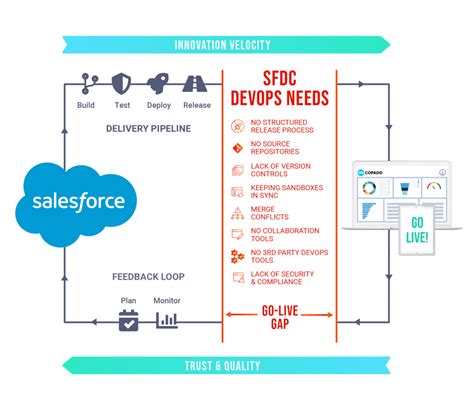Copado: Efficient Object Sharing Deployment for Salesforce
Salesforce deployments can be complex, especially when dealing with intricate object sharing rules. Incorrectly deploying these rules can lead to data accessibility issues, impacting user productivity and potentially causing significant business disruption. Copado, a leading DevOps platform for Salesforce, offers a robust and efficient solution for managing and deploying object sharing settings, minimizing risk and maximizing deployment success. This article delves into how Copado streamlines the process, addressing common challenges and ensuring seamless data access control.
What are Object Sharing Rules in Salesforce?
Before diving into Copado's solution, let's briefly understand Salesforce Object Sharing. These rules define which users or groups can access specific records within a Salesforce org. They govern data visibility and security, crucial for maintaining data integrity and compliance. Sharing rules can be hierarchical, complex, and interdependent, making manual management incredibly time-consuming and error-prone. Incorrect configuration can lead to unintended data exposure or, conversely, prevent users from accessing necessary information.
Why is Efficient Deployment of Object Sharing Crucial?
Efficient object sharing deployment is critical for several reasons:
- Data Security: Incorrect sharing rules can expose sensitive data to unauthorized users, compromising security and potentially violating regulations.
- User Productivity: If users lack access to necessary data due to faulty sharing settings, their productivity suffers, impacting project timelines and overall business efficiency.
- Deployment Reliability: Manual deployments of complex sharing rules are prone to errors, leading to failed deployments and requiring time-consuming rollbacks.
- Scalability: As your Salesforce org grows, managing sharing rules manually becomes increasingly unsustainable.
How Copado Simplifies Object Sharing Deployment
Copado's strength lies in its ability to automate and manage the entire Salesforce deployment lifecycle, including complex object sharing rules. Here's how it ensures efficient and reliable deployments:
- Automated Deployment: Copado automates the entire process, reducing the risk of human error significantly. It handles the complexities of dependencies between different sharing rules, ensuring a consistent and reliable deployment.
- Version Control: Copado integrates with Git, allowing for version control of your sharing rules. This enables rollback to previous versions if issues arise, minimizing downtime.
- Change Management: Copado provides a clear audit trail of all changes made to object sharing rules, improving transparency and accountability.
- Testing and Validation: Copado enables automated testing of sharing rules before deployment, ensuring that the intended access controls are in place without negatively impacting users.
- Parallel Deployments: Copado allows for parallel deployments, minimizing downtime and accelerating the release cycle.
Copado's Features for Advanced Object Sharing Management
Copado boasts several features specifically designed for advanced object sharing management:
- Metadata Comparison: Copado facilitates a detailed comparison of sharing rules between different environments (e.g., Sandbox and Production), highlighting differences to streamline the deployment process.
- Conflict Resolution: If conflicts arise during deployment, Copado provides tools to effectively resolve them, preventing deployment failures.
- Rollback Capabilities: In the unlikely event of a deployment issue, Copado allows for quick and easy rollback to a previous stable state.
- Integration with Other Tools: Copado integrates with other Salesforce DevOps tools, creating a unified and comprehensive platform for managing the entire deployment lifecycle.
Addressing Common Challenges with Copado
Many organizations struggle with the following challenges related to Salesforce object sharing deployments:
H2: How does Copado handle complex dependencies between sharing rules?
Copado intelligently analyzes the dependencies between different sharing rules, deploying them in the correct order to prevent conflicts and ensure data integrity. Its advanced algorithms identify and resolve potential issues before deployment, minimizing risks.
H2: How can I ensure data security during object sharing deployments with Copado?
Copado's automated testing and validation features help guarantee data security by verifying that the deployed sharing rules align with the intended access controls. Its version control capabilities provide a safety net, enabling easy rollback in case of unexpected issues.
H2: What are the best practices for using Copado to deploy object sharing rules?
Best practices include: thoroughly testing sharing rules in a sandbox environment before deploying to production, utilizing Copado's metadata comparison feature to identify differences between environments, and leveraging its automated deployment capabilities for efficiency and accuracy.
Conclusion
Copado significantly improves the efficiency and reliability of Salesforce object sharing deployments. By automating the process, implementing version control, and providing robust testing and validation features, Copado minimizes risks, enhances data security, and increases user productivity. For organizations struggling with complex object sharing configurations, Copado offers a valuable solution for streamlined, reliable, and secure deployments. The platform's advanced capabilities address many of the common challenges associated with managing object sharing rules, making it an indispensable tool for any serious Salesforce DevOps team.

